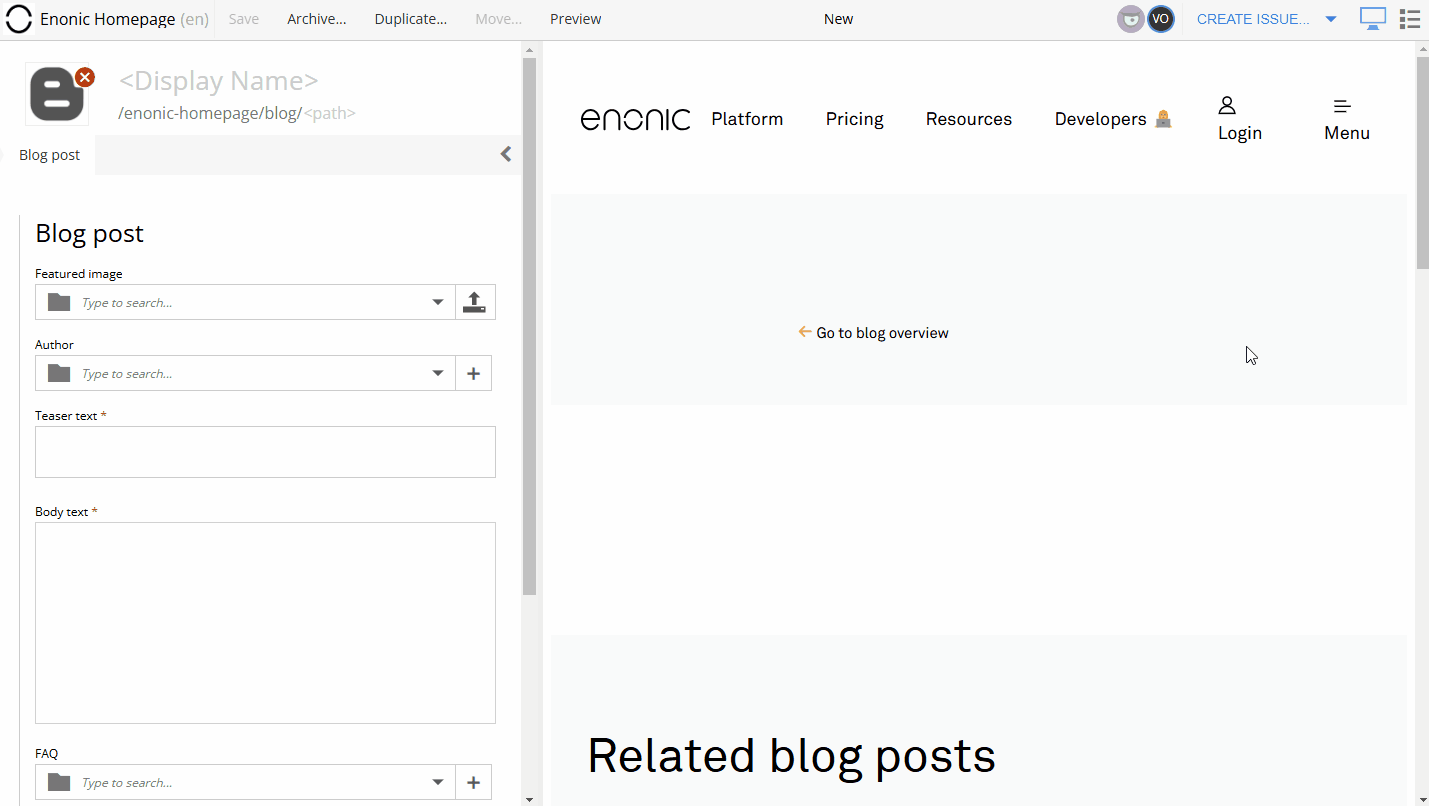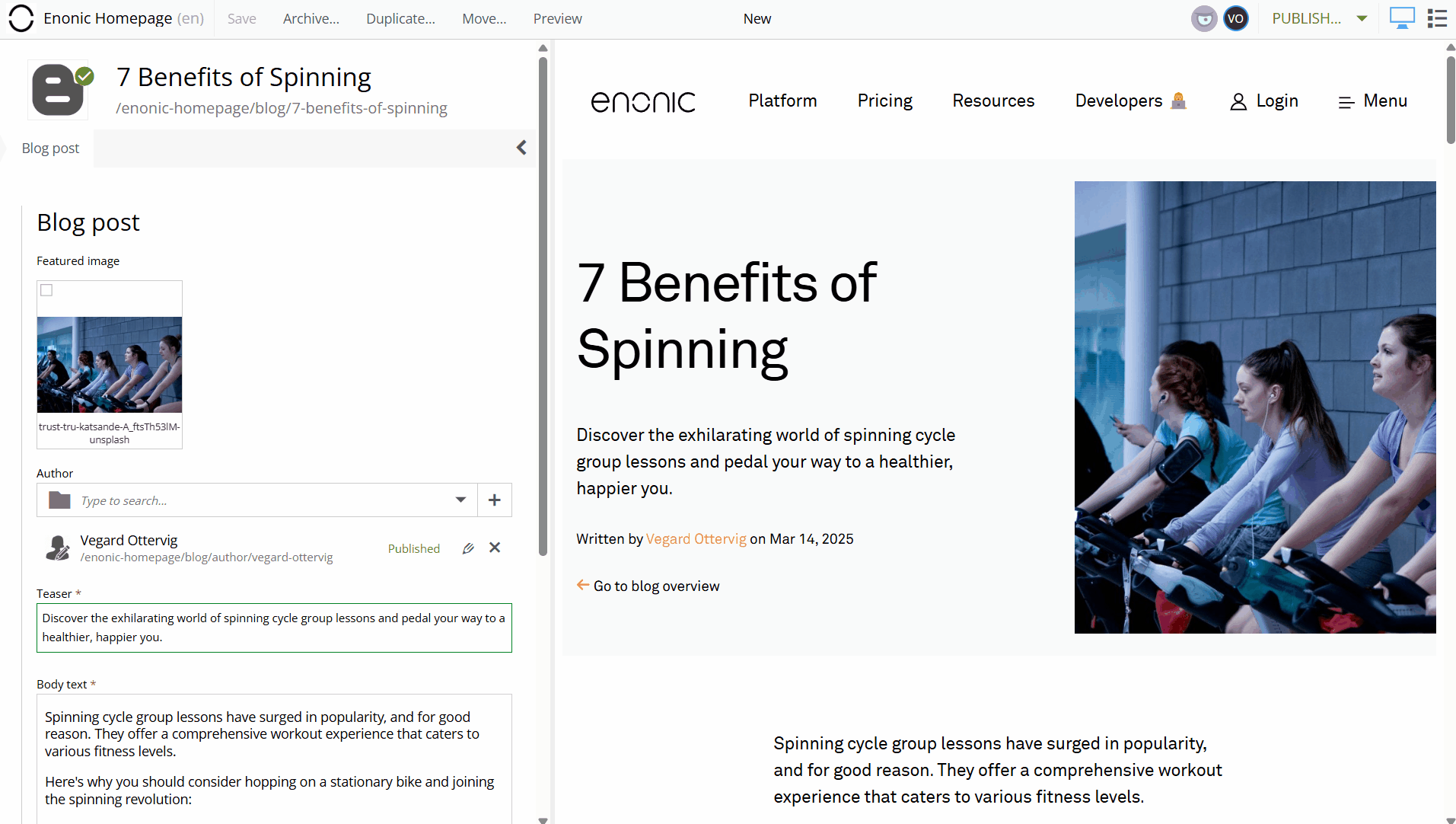Our New AI Will Boost Your Content Productivity
Enonic empowers content editors with AI features and capabilities in the form of a new virtual colleague – Juke.
Written by Morten Eriksen on

Enonic empowers content editors with AI features and capabilities in the form of a new virtual colleague – Juke.
Written by Morten Eriksen on
We’re excited to introduce Juke, a brand-new virtual colleague designed to streamline your content management.
Juke is not just another tool—it’s an AI-powered assistant that provides content suggestions, improvements, and translations, right inside the Enonic platform.
And the best part? Juke is only getting started! We can't wait to tell you about all his future capabilities, but for now, let’s talk about what he actually can do.

One of Juke’s core functions is serving as a Content Operator. Think of it as an AI companion that helps generate new text, enhance existing copy, and assist in organizing the editorial workflow.
From blog posts to website copy, Juke can offer ideas, structure, and even full text passages that you can modify and refine to fit your brand voice.

To ensure the output aligns with your unique brand or organizational tone, Juke allows you to configure context in the app settings.
This context can be as general or specific as you like—whether it’s a style guide for formal press releases or a more casual, playful approach for social media.
By defining the context, you help Juke understand the scenario it’s writing for, improving relevance and consistency in the generated content.
Inside any given content type, you can see Juke as a “user” in the top right corner. Clicking on him brings up a floating window with Chat Prompts. Here you can have a conversation with Juke to brainstorm ideas, explore new angles, or refine a piece of text.
Juke recognizes the different fields in a content type, like for instance the title, the intro text, and the body text. By default, he can create suggestions for each field, which you can insert in bulk or individually. You can also tag a field with @ to create suggestions only for that.
When editing or creating content items in Enonic with different content fields, your can use the nearby field prompt to call upon Juke’s assistance. The chat window is summoned once again, but now tuned specifically for the chosen field only.
This makes it easy to integrate AI generation directly in the fields where you typically write headlines, lead paragraphs, product descriptions, or meta details.
One of the most powerful features of Juke is its ability to provide alternatives. Not sure if a headline is catchy enough? You can ask Juke to generate multiple variations, giving you options to choose from or combine straight in the interface.
Need a punchy tagline for a campaign? Ask Juke to propose alternatives to kickstart your creative process.
Beyond writing and idea generation, Juke also functions as a Content Translator. This feature is a major time-saver for organizations that cater to multiple markets or need quick translations for various content types.

The translation process uses the same contextual approach as the content generation feature. Go into the app and configure the instructions to include for instance a custom dictionary.
You can set up such configuration in each individual content layer—for instance, an English parent layer, a Norwegian child layer, etc. Aside from child layers inheriting content from parent layers, each layer may have separate teams, content, publishing dates, and now even instructions for the localization.
Simply hit “Localize” on a content item to trigger Juke’s AI to translate your content. This prompts Juke to apply the relevant context before generating the translation.
If you need to fine-tune or override the default context—perhaps for a region-specific campaign—you can do so easily. This ensures the translation aligns with any nuanced requirements for different locales.
For our Norwegian community, Juke supports Nynorsk translations to ensure your content remains accurate, culturally relevant, and compliant with local language standards.
We built Juke to address the growing need for AI-assisted content creation and localization within the digital experience industry—something we first hinted at in our “What’s Cooking?” article.
Organizations today require a dynamic, efficient, and context-sensitive way to produce and translate large volumes of quality content. Juke speeds up editorial processes, alleviates the mundane aspects of writing, and allows content teams to focus on strategy, creativity, and storytelling.
The initial vision for Juke—codenamed “Saga” in January 2024—aimed to extend beyond mere form-filling to automate tasks like creating pages, performing bulk updates, and tackling repetitive content maintenance.
Early prototypes used OpenAI’s 3.5 Turbo and 4.0 models via the Assistant API, paired with a React-based interface for stateful discussions. By mid-year, Enonic introduced a working demo featuring a chat interface referencing specific fields in structured forms, offering relevant suggestions for “TextArea” fields and enabling quick insertion of generated text.
Throughout this development, challenges arose with token-based input limits, JSON consistency, performance demands, and stateful API storage limitations—prompting Enonic to consider factors like reliability, speed, security, and the implications of the EU’s AI Act for digital experiences.
To overcome these hurdles, Enonic adopted Google’s Vertex AI and the forthcoming Gemini models, which provide massive context sizes, cost efficiency, and broad model flexibility through the “Model Garden.”
This pivot underpins key features such as the AI Copywriter and AI Translator, both designed to function within Content Studio’s structured data context. The AI Copywriter allows editors to chat with the AI for field-specific responses, multi-step prompts, and structured JSON output, while the AI Translator locks fields during processing and rapidly localizes content.
Custom instructions for tone and vocabulary can be applied, and these capabilities will likely expand to bulk operations and additional automation.
Underlying the system are advanced prompting methods, parallel processing for speed, and careful handling of data privacy; Enonic sends only the necessary schema definitions, field values, and user instructions without long-term storage, while Google’s Vertex AI ensures business APIs do not use client data for model training.
It is out now!
Yes, you heard right—Juke is available on Enonic Market today. Head over to the app pages for the Content Operator and the Content Translator to start exploring the new AI capabilities.
If you need guidance, we have step-by-step tutorials and best-practice documentation to get you started.
While Juke’s initial feature set is already making a splash, we have big plans for the future. Expect ongoing improvements in AI understanding, enhanced localization options, and additional context layers to cover a wider range of scenarios.
We also plan to expand Juke with automated SEO optimization (to streamline tagging and improve discoverability), mass updates (e.g., finding and revising references when an employee leaves), media generation (producing videos, music, podcasts, and landing pages based on user input), automated workflows (suggesting months of blog post ideas), and content analysis (pinpointing trends and areas for improvement).
We’re continuously learning from user feedback and improving the overall experience. Stay tuned for more updates!
Interested in learning more, or ready to give it a try? Check out our resources on how Juke writes and translates content and the more in-depth behind-the-scenes story.
We can’t wait to see how you’ll boost your content productivity with Juke!
Get some more insights 🤓